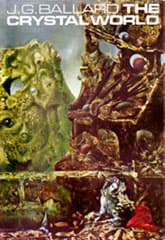The Crystal World
Critique • Quotes
 First edition
First editionFirst publication
1966
Literature form
Novel
Genres
Science fiction
Writing language
English
Author's country
England
Length
Approx. 56,500 words
Into the heart of lightness
If The Crystal World were a typical science fiction novel about an impending global disaster, it'd have scientists and military heroes working against the clock trying to stop the apocalypse. In J.G. Ballard's world, however, that isn't the drama which unfolds. The crystallization threatening our planet in his novel has been working through the entire universe and is inevitable. There may be authorities somewhere trying to defeat the transformation spreading across our planet from three locales, but they aren't part of this story.
The central conflict in The Crystal World has to do with how certain powerless characters in one place respond psychologically to the spreading crystalization. And how they do is almost as bizarre as the phenomenon itself. For they seem to be both repulsed and attracted by it, as if the external transformation happening to the world reflects something taking place within their own hearts and minds. This isn't a story of man against nature, but of man against himself.
Scientific-sounding explanations are given for the phenomenon. Something about a process beginning in distant galaxies, of matter colliding with anti-matter, causing a leaking of time from the universe and the super-saturation of our own world.
Whatever. The important thing is, unlike in most apocalyptic fiction, the seeming disaster is neither caused by human activity nor preventable through human intervention. It's a terribly beautiful and impersonal phenomenon—with deeply personal repercussions.
Frustrating classic scifi readers
As should be obvious to any English literature student, The Crystal World evokes Joseph Conrad's The Heart of Darkness, starting with an homage of sorts in the opening line. Again we are following a river into the African interior, in search of a figure who has been lost to the strange dark forces—although in this case the forest, bedecked with new jewels, is glowing with compressed light. The doctor Edward Sanders is going in search of his aptly surnamed, former lover Suzanne Clair and her husband, who have been working with lepers.
Sanders and the adventurers he gets involved with on his quest into the continent are oddly not freaked out by the changes taking place, as trees, alligators, birds, dwellings and people turn to crystal around them. You'd think they'd be running in fear from the destruction. Rather, consumed by personal relationships—wracked with obsessions, jealousies, possessiveness and hatred—they're dancing in and out of the creeping crystals, taking verbal and physical shots at each other.
This can be maddening to readers from a classic science fiction or thriller background. You want to see the hero save the woman of his dreams and the good guys save the world from this global threat.
That's not going to happen in a Ballardian world.
Ballard was a leader of the New Wave science fiction in the 1960s that changed the field, taking the emphasis off hard science and placing it on psychology. With each of his early novels of natural disasters, he got further out. Or in. The Crystal World, the fourth one, is the most conceptually alien yet in its depiction of what's happening in the physical world, yet the most coolly clinical in the mental deconstruction of its protagonist.
Has to be experienced
It's hard to describe what's going on in a book like The Crystal World without sounding pretentious, hauling out those big words like "conceptual" and "deconstruction". But they can be misleading, because that's not how the novel reads. Apart from a few quickly dispensed scientific notions and a few colourful words to describe what's happening to the world (a favourite Ballard word is "deliquesce" which means to decompose into liquid), the writing is plain and clear.
For all that's been said about this being a psychological novel, it has precious little interior dialogue. No stream of consciousness, thank god. Most of Sanders's thoughts and spoken dialogue have to do with his interactions with the characters and his practical plans. We infer the psychological dimension from the characters' actions.
Again, getting across exactly how this novel works is tricky. It's a strange experience that has to be...experienced. And I imagine it does not work for everyone. I can see intelligent, sensitive readers just not getting it. Even those who do get it, probably don't get it all. Like the phenomenon that threatens their world, the characters responding to it remain largely a mystery. For some of us this may be off-putting. For others it may be intriguing, leaving us to ponder what it all means over the time and space to come.
Like the characters, we are both repulsed by and drawn in to The Crystal World.
— Eric
Critique • Quotes

